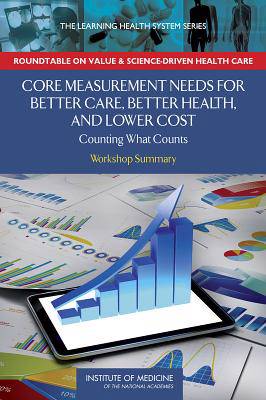
- Afhalen na 1 uur in een winkel met voorraad
- Gratis thuislevering in België vanaf € 30
- Ruim aanbod met 7 miljoen producten
- Afhalen na 1 uur in een winkel met voorraad
- Gratis thuislevering in België vanaf € 30
- Ruim aanbod met 7 miljoen producten
Core Measurement Needs for Better Care, Better Health, and Lower Costs
Counting What Counts: Workshop Summary
Institute of Medicine, Roundtable on Value and Science-Driven Health CareOmschrijving
Health care quality and its affordability have become very pressing issues in the United States. All sectors of the country are attempting to push forward initiatives that will improve the health care system as well as the health of the American population in general. Despite the economical dedication to health care, about 1/5, the system remains uneven and fragmented, patient harm is quite common, care is often uncoordinated, and many more mishaps occur. There exists many obstacles to improve the nation's health care system; these include the capacity to reliably and consistently measure progress. In 2006 the Institute of Medicine (IOM) established the Roundtable on Value & Science-Driven Health Care which has since accelerated the development of a learning health system- one in which science, informatics, incentives, and culture are aligned to create a continuous learning loop. This learning loop would thus help make the health care system better.
In response, the IOM organized a 2-day workshop to explore in depth the core measurement needs for population health, health care quality, and health care costs. The workshop hoped to gain a full understanding of how to improve the nation's measurement capacity to track progress in the health care system. Having this knowledge would help the nation get one step closer to the creation of an efficient learning loop.
The workshop was divided into a series of sessions that focused on different aspects of measurement. Core Measurement Needs for Better Care, Better Health, and Lower Costs: Counting What Counts: Workshop Summary includes explanations and key details for these sessions: Vision, Current Measurement Capabilities, Specifying the Shape of a Core Metric Set, and Implementation. The report also features common themes within these areas, the workshop agenda, and information about those involved.
Specificaties
Betrokkenen
- Auteur(s):
- Uitgeverij:
Inhoud
- Aantal bladzijden:
- 148
- Taal:
- Engels
- Reeks:
Eigenschappen
- Productcode (EAN):
- 9780309285223
- Verschijningsdatum:
- 30/09/2013
- Uitvoering:
- Paperback
- Formaat:
- Trade paperback (VS)
- Afmetingen:
- 152 mm x 226 mm
- Gewicht:
- 258 g

Alleen bij Standaard Boekhandel
Beoordelingen
We publiceren alleen reviews die voldoen aan de voorwaarden voor reviews. Bekijk onze voorwaarden voor reviews.











